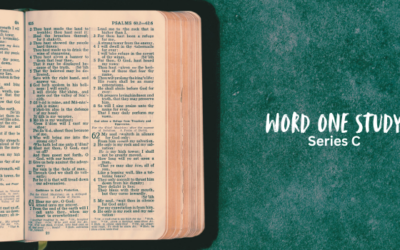Download a PDF of the Word One Bible Study, Lectionary Series A.
Text: Matthew 3:1-12
Objectives
Participants will:
- Know who John the Baptist is and his purpose as prophet.
- Explain how John the Baptist connects the two Testaments.
- Cling to the way of repentance that John the Baptist preached and believe in Jesus as the fulfilled promise of the coming Messiah.
Materials Needed
Bible
Lutheran Service Book
Picture of the ancient Colossus wonder of the world
Paper
Pencil/Pen
A chalkboard, overhead projector, or flip-chart
Group Guidelines
Most of this study will be done as an entire class. In the Reinforcing section, divide students into groups of 3-4. Assign a leader for the purpose of being a task-master. Also, assign a different student in each group to be a reporter; the reporter will report the group’s work back to the class.
Building Community
- Have students open with a short prayer. Have the class sing, “By All Your Saints in Warfare” (LSB 517, 518).
- Have students call out what they picture as attributes of a prophet. List the various attributes on the chalkboard. Then, utilizing the students’ list on the chalkboard, have them read through verse 15 again and see if they can pick out anything special about John the Baptist. Include any new insights in the list on the board.
- Have the group turn to Matthew 3:1-12. Repeat the exercise and discuss what John’s message must have sounded like to the people. Ask students how they think people in John’s time and in contemporary society would react to his message. List contrasts and comparisons. For example, “First-century Jews may have seen John as a throwback to Elijah; however, modern people would probably think he was just crazy.”
Looking at God’s Word
- Read through Matthew 3:1-12. Present John’s view of himself. Examine Isaiah 40:3 in light of John’s claim about himself. Also, expound upon 2 Kings 1:8 and Leviticus 11:22.
- Present a basic understanding of Old Testament prophets and their function, namely pronouncement of judgment and proclamation of Gospel. Compare this with John’s actions in Matthew 3:1-12. In what ways does John proclaim the law? In what ways does he proclaim the Gospel?
- Examine John’s New Testament role, namely testifying to the Lamb of God.
- John had one foot in the Old Testament, and one foot in the New. On one side, John is calling people to repentance and pointing to the coming of the kingdom of God. On the other side, John is testifying to the fulfilled promise of the coming of the Messiah (Mark 1:1-18, Luke 3:1-21, and John 1:15-34).
Reinforcing What Has Been Learned
- Divide students into groups. Provide a piece of paper with the Old Testament references to the prophecies which John fulfills (Isaiah 40:3, Malachi 3:1), and persons he echoes (Elijah in 2 Kings). Have the groups look up and connect John to as many Old Testament references as time permits.
- Where does John seem to belong in the Bible? Why do you think that God specifically picked the time He did to have John begin his ministry?
- In groups, consider how John’s message must have sounded to the people of his day. That message had relevance in both the Old and New Testament. How much relevance does it have today? What about to you specifically? Discuss what important messages John bears to us about Jesus Christ, and how that message should inform our attitude toward Jesus. How does John’s message inform our attitude toward the Bible’s message about Jesus?
Closing
For closing, the leader should, having noted the ideas from the groups on the chalkboard, say a prayer thanking God for the message that He has give us. Specifically note the importance of that message in the prayer by using the reporting of the groups as a guide.
By Joe Cox
Originally published in Discovery Bible Studies 11, studies on the Gospel readings for lectionary series A, in 1998.
Republished and revised in October 2013 for youthESource.











0 Comments